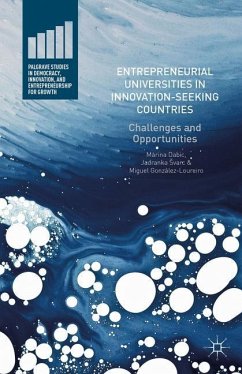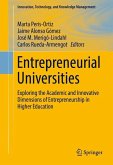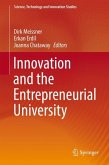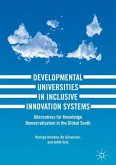What does it mean for a university to be entrepreneurial? This global concept, which enables universities to attain social accountability through innovation and participation in local economic development, has become more important than ever in today's knowledge society. This book considers how an entrepreneurial university can improve the social and economic development of countries which are lagging behind in cutting-edge technologies and science-based innovation. Exploring university models in two moderately innovative countries, Spain and Croatia, this book examines how universities can work within the capacities of the business sector while still preserving the universities' social and cultural identities.
Using empirically-based case studies and survey results from faculty members in several European countries, the authors reveal the challenges and opportunities to becoming a more entrepreneurial university. It is a great resource for researchers and faculty looking to adopt this paradigm and gain perspective on how it can be applied globally.
Using empirically-based case studies and survey results from faculty members in several European countries, the authors reveal the challenges and opportunities to becoming a more entrepreneurial university. It is a great resource for researchers and faculty looking to adopt this paradigm and gain perspective on how it can be applied globally.
Michael Harvey, University of Arizona
I will follow the recommended Reviewer Guidelines:
1.) Short Outline: The book addresses issues associated with viewing universities in an entrepreneurial light. What could be done to make universities more entrepreneurial and how can administration/faculty become more like entrepreneurs and discard the organizational tenets of academia? The strategic lens (e.g., knowledge-based society) used by the authors examines what role is appropriate in this type of global universe. The recommendation of the authors is to convert universities into more entrepreneurial organizations focused on education and at the same time, how to run educational institutions more effectively/efficiently. To illustrate the authors' points is accomplished by examining two case histories (e.g., Spain and Croatia) as explores) as exemplars.
2.) Useful and/or Original Contribution to the Field? The idea of being more entrepreneurial in a not-for-profit context is not new in-and-of-itself, the extent that the present authors are attempting to take the concept is unique. I think there are good points that are presented by the authors that would make their viewpoint unique and/or different that the past attempts at challenging the traditional means of 'running' a university.
3.) Engage Recent Scholarship: The book has incorporated the depth/breath of the existing literature. Professor Gonzales-Loureiro is building a reputation on using the latest harvesting methodologies to compile the foundations of a particular body of knowledge and it serves him well in this research effort. I think it would be difficult to come-up with substantive addition to the materials already identified by the authors.
4.) Strengths/Weaknesses of the Manuscript? There should be no confusion as to what is the strength of the book....challenging administrators/faculty to think of academic environment as being too static for today's rapidly globalization trend. Therefore, academics need to integrate entrepreneurial wave of change into academic institutions.
Weakness of the book is that I do not think the two environments selected (e.g., Spain, Croatia) are representing of all/some institutions that are being more entrepreneurial therefore limiting the application of the concept (e.g., entrepreneurialism) which I do not think should be the way to sell the concept to academics. I would do little vignettes to better illustrate how this approach as already been successful in other institutions.
5.) Authors Suitably Qualified? I know two of the authors' publications and feel that have a background broad/deep enough to write this book. I did not come across any areas in the book that I thought were poorly done (having a good English editor craft the book would improve its acceptance.
6.) Aware of Inclusion: Do know have any knowledge.
7.) Interdisciplinary Appeal: Not aware of any such thing.
8.) Compare with Existing Books: Not familiar with other books in the field. Endorsement after some revisions.
Given the work that has already been expended on the project I would think this would be a good additional to a collection or related issues.
I will follow the recommended Reviewer Guidelines:
1.) Short Outline: The book addresses issues associated with viewing universities in an entrepreneurial light. What could be done to make universities more entrepreneurial and how can administration/faculty become more like entrepreneurs and discard the organizational tenets of academia? The strategic lens (e.g., knowledge-based society) used by the authors examines what role is appropriate in this type of global universe. The recommendation of the authors is to convert universities into more entrepreneurial organizations focused on education and at the same time, how to run educational institutions more effectively/efficiently. To illustrate the authors' points is accomplished by examining two case histories (e.g., Spain and Croatia) as explores) as exemplars.
2.) Useful and/or Original Contribution to the Field? The idea of being more entrepreneurial in a not-for-profit context is not new in-and-of-itself, the extent that the present authors are attempting to take the concept is unique. I think there are good points that are presented by the authors that would make their viewpoint unique and/or different that the past attempts at challenging the traditional means of 'running' a university.
3.) Engage Recent Scholarship: The book has incorporated the depth/breath of the existing literature. Professor Gonzales-Loureiro is building a reputation on using the latest harvesting methodologies to compile the foundations of a particular body of knowledge and it serves him well in this research effort. I think it would be difficult to come-up with substantive addition to the materials already identified by the authors.
4.) Strengths/Weaknesses of the Manuscript? There should be no confusion as to what is the strength of the book....challenging administrators/faculty to think of academic environment as being too static for today's rapidly globalization trend. Therefore, academics need to integrate entrepreneurial wave of change into academic institutions.
Weakness of the book is that I do not think the two environments selected (e.g., Spain, Croatia) are representing of all/some institutions that are being more entrepreneurial therefore limiting the application of the concept (e.g., entrepreneurialism) which I do not think should be the way to sell the concept to academics. I would do little vignettes to better illustrate how this approach as already been successful in other institutions.
5.) Authors Suitably Qualified? I know two of the authors' publications and feel that have a background broad/deep enough to write this book. I did not come across any areas in the book that I thought were poorly done (having a good English editor craft the book would improve its acceptance.
6.) Aware of Inclusion: Do know have any knowledge.
7.) Interdisciplinary Appeal: Not aware of any such thing.
8.) Compare with Existing Books: Not familiar with other books in the field. Endorsement after some revisions.
Given the work that has already been expended on the project I would think this would be a good additional to a collection or related issues.








